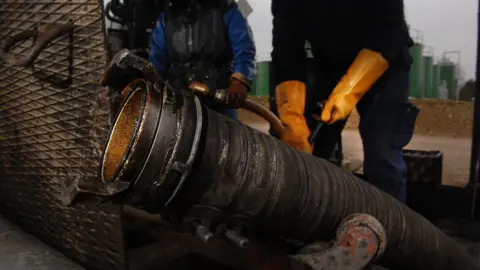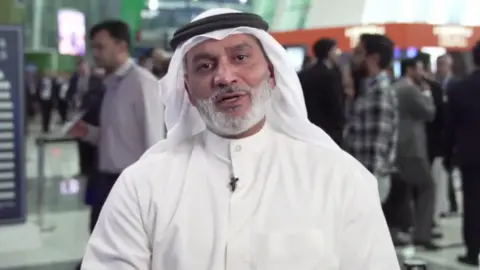Oil cartel leader says demand expected to grow
 Getty Images
Getty ImagesDemand for oil will continue to grow and remain "resilient" this year, according to the secretary general of Opec+.
Opec+ is a group of 23 oil-exporting countries which decides how much crude oil to sell on the world market.
"We see demand growing about 2.4 million barrels a day," Haitham Al Ghais told the BBC.
Saudi Arabia said it would be cutting its production of crude oil by a million barrels a day to boost prices.
The International Energy Agency (IEA) said the decision by Saudi Arabia and Russia - two major oil producers and members of Opec+ - to cut production could cause a "significant supply shortfall" by the end of this year.
Mr Al Ghais said: "This is a voluntary decision taken by two sovereign nations, Saudi Arabia and Russia. This decision can be described as precautionary or pre-emptive because of uncertainties".

Following Russia's invasion of Ukraine in February 2022, oil prices soared, hitting more than $120 a barrel in June last year. They fell back to a little above $70 a barrel in May this year, but have steadily risen since then as producers have tried to restrict output to support the market.
Brent crude, a benchmark for prices, breached $95 a barrel on Tuesday amid predictions of shorter supplies, with fears the price may breach $100 per barrel. The rise prompted a warning to drivers that fuel prices could rise in the coming 10 months, and stoked fears that inflation in key economies could be prolonged.
But Mr Al Ghais said Opec was more concerned about "under investment" in the oil sector.
"Some have called for stopping investments in oil. We believe this is equally dangerous. It will lead to volatility in the future, possible supply shortages. And therefore we at Opec have always advocated for the importance of continuing to invest in the oil industry as we also invest in decarbonising the industry and move on to adding other forms of alternative energy such as renewables".
Asked if he was concerned about rising oil prices affecting inflation around the world if it goes above $100 a barrel, Mr Al Ghais said it was "important not to look at things in a short-sighted manner".
"For next year we see demand continuing to grow north of 2 million barrels a day - of course, all subject to some of the uncertainties in the global market. Nevertheless, we still feel quite optimistic... that global oil demand is going to be quite resilient this year".
Mr Al Ghais said that the oil industry would need close to $14tn in investment to the year 2045.
"Energy demand will grow by nearly 25% by the year 2045 compared to what it is today - and all forms of energy will be required", he said.
His comments come ahead of a meeting of key oil players on Wednesday in Abu Dhabi for the International Petroleum Exhibition and Conference (ADIPEC).
